Lumped together: Karachi's immigrants want to be counted in the census
No mechanism to differentiate between legal, illegal immigrants in population census
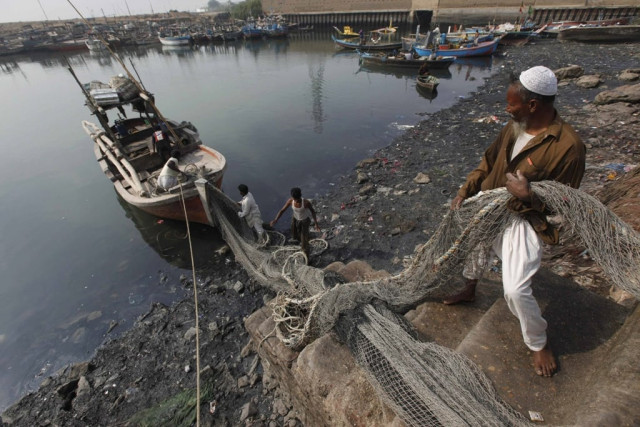
Men load fish nets onto a boat before they depart for a catch at the Ibrahim Hyderi fish harbor, some 17 km (11 miles) from Karachi on December 7, 2012. Ibrahim Hyderi is a town in District Malir where most of the Bengali and Burmese community lives. PHOTO: REUTERS
Karachi hosts the most immigrants in the country from countries such as Bangladesh, Myanmar, Afghanistan and other African and Central Asian states but the exact number of immigrants has not been ascertained, raising concerns that these illegal residents have also managed to procure Computerised National Identity Cards (CNICs).
When The Express Tribune visited a Bengali settlement in Ibrahim Hyderi, the general secretary of the Pakistani Bengali Action Committee, Habibur Rehman, said 80% of the Bengalis had CNICs but right now of this 80%, the cards of 50% people are not being renewed, increasing their fear that they will not be counted in the national census.
Two illegal immigrants among six suspects arrested in Karachi
"The government should include us in the census. We fear that they might ignore us," he said, adding that they are the descendants of Bengalis who chose to live in Pakistan after the 1971 war.
It is imperative for people living in Sindh, especially Karachi, to be included in the census so that resources can be distributed accordingly. "We Bengalis are Pakistani nationals and must be included in the census," demanded Rehman.
A Burmese immigrant, Molana Abdul Kalam Ashrafi, of Ali Brohi Goth said his father migrated to Pakistan in 1962 when the factories of the Dadabhoys and Adamjees were shifted from Rangoon to Karachi.
Iran deports over 20,000 illegal Pakistani immigrants every year
"I have a CNIC but thousands of others who migrated to Pakistan have been deprived of it, raising their concerns whether they will be counted as illegal immigrants or refugees," he said.
Pakistan Bengali Action Committee vice-chairperson Muhammad Rafiq alHussaini said, "Hum tou kisi ginti mein hi nai hain [We are not counted anywhere]". He added that it was the Bengalis who were at the forefront of the Independence movement and made the Muslim League, yet they are considered illegal immigrants.
Gadap Town in District Malir, on the other hand, hosts the majority of illegal Afghan immigrants and refugees. According to local resident Shahadatullah Akhunzada, his ancestors belong to Afghanistan but he was born in Karachi after his father migrated from Afghanistan in the late 1980s. Akhunzada said he does not have a CNIC but wants to be recognised as a Pakistani national since he was born here.
Illegal immigrants: FIA arrests NADRA official for registering ‘aliens’
"My father had acquired a CNIC but he died a few years ago. When I went to the NADRA office [after his death] for my CNIC, I was asked to produce my father's NIC, which was not available, therefore, I was denied," he recalled. "I could have made my CNIC after paying a Rs20,000 to Rs30,000 bribe but I am a poor fruit vendor and could not afford to do that."
Akhunzada added that he has heard about the census in the news and is upset about not being counted as a Pakistani citizen, especially since he was denied a CNIC by the authorities.
Assistant Census Commissioner Muhammad Suleman of Ibrahim Hyderi, a town in District Malir where most of the Bengali and Burmese community lives, said, "We have not been told about any strategy or mechanism for identifying illegal immigrants and instead have been only asked to count people with valid CNICs".
2.5 million illegal immigrants living in Sindh: Interior secretary
According to him, if any of the family members has a CNIC, they will count and register the entire family as Pakistani national.
Tariq Suleman, the assistant census commissioner of Shah Mureed, Gadap Town, said they have been directed not to visit the Afghan Basti, since a majority of them do not have CNICs.
Zahid Farooq, director of the Urban Resource Centre, a non-governmental organisation, said that though most of the Afghan immigrants claim they want to continue living in Pakistan as citizens, whenever a family member dies, they take their body back to Afghanistan. “How can one prove his loyalty to a country when he chooses not to bury himself in Pakistan?” he asked.
Farooq was of the view that now is the opportunity for which a mechanism must be devised to at least count these immigrants in order to determine their numbers and former nationalities. He said by doing this, the government will be able to prevent these illegal immigrants from obtaining CNICs in the future as they are a 'great burden on our economy'.
Pakistan Bureau of Statistics member of the census and survey, Habibullah Khan, said the census staff, after counting the family members, will contact NADRA to verify the family tree.
"During the census, we only need one NIC of a family, through which we can trace all the family members and no one can misguide us," he said, adding that a penalty of over Rs50,000 and six months imprisonment has been suggested for people misleading census officials during the process. "The army and census personnel will have magisterial powers and can take action [against offenders] within minutes," he said.

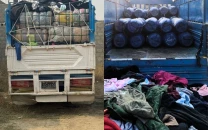

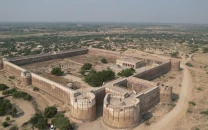
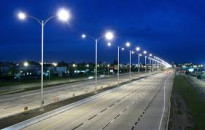
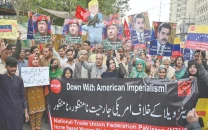
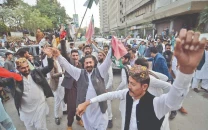












COMMENTS
Comments are moderated and generally will be posted if they are on-topic and not abusive.
For more information, please see our Comments FAQ